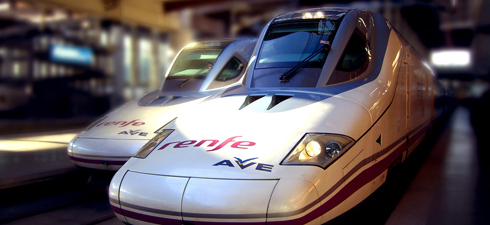Over the past few years, Spain has spent unprecedented sums on new infrastructures. The results are plain to see: we now lead Europe in miles of motorway and have just overtaken France as Europe’s number-one country in high-speed trains since the Madrid-Valencia line got started. We now have 2,665 km of railway tracks in service, so Spain’s network is second only to China.
This raises two questions. First of all, can Spain afford this mark of distinction in these times of crisis? Secondly, does the layout of the grid accord with sound regional planning? Doesn’t a decidedly radial system with its epicentre in Madrid need peripheral lines to round it out, like the much-clamoured-for Mediterranean [Barcelona-Valencia] corridor?
Taking lorries off the roads and planes out of the air
Valencia, the last big city to get an AVE [Spanish high-speed train], has exuberantly applauded the new infrastructure. But ecologists, trade unions and sustainable development advocates see the whole high-speed scheme as a bona fide policy error typical of a nouveau riche nation. "The big difference between Spain and other European countries is that they plan services there, whereas here in Spain we only plan infrastructure," laments Pau Noy, a member of the Foundation for Sustainable and Safe Mobility. "The main thing here is to get the AVE, regardless of whether we need it, how much it costs or how many passengers it’ll carry.”
Why waste a fortune – €6 billion – on AVE, which, according to official forecasts, will only carry 3.5 million passengers its first year in operation? That figure pales next to the 400 million trips made on RENFE commuter rail in 2009.
The crisis has brought the age of munificence and big investment to an end, and critics of this AVE-for-everyone policy are calling on the government to come up with a more rational approach. "This is a segregationist model that forces young people onto the bus and the highway, because high speed is expensive,” deplores Noy.
High speed only benefits Madrid
Gregorio Martín, a professor at the University of Valencia, says the matter is not all that simple. "It was necessary to take lorries off the roads and planes out of the air, the two most polluting means of transport, after the Kyoto Protocol on Climate Change. So it’s true the AVE has much better environmental and energy consumption parameters than the airplane, nearly four to one.”
However, ecologists and Spanish mobility advocates object to the layout of the high-speed network. "Europe is watching bewildered at the way we’re using European funds. Instead of fostering cohesion by improving local transport, Spain has opted for high speed – which only benefits Madrid and turns Valencia, Zaragoza and other cities into suburbs of the capital," argues Noy. Madrid already has AVE links to 21 Spanish cities, though successive governments originally proposed connecting up the vast majority of the provincial capitals with the centre.
The priority now at the Ministry of Public Works is to complete this initial radial scheme, which cannot be done without injections of private-sector capital. So for some time now public works minister José Blanco has been scouring the US and China in search of private investors.
Translated from the Spanish by Eric Rosencrantz
Was this article useful? If so we are delighted!
It is freely available because we believe that the right to free and independent information is essential for democracy. But this right is not guaranteed forever, and independence comes at a cost. We need your support in order to continue publishing independent, multilingual news for all Europeans.
Discover our subscription offers and their exclusive benefits and become a member of our community now!












